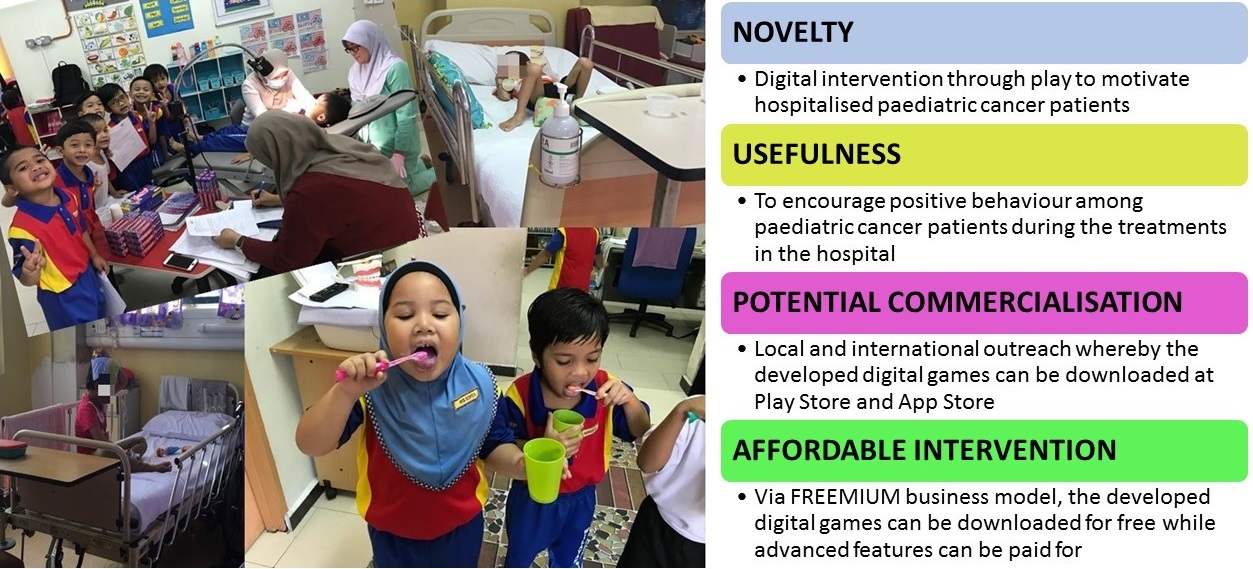Designing Digital Interventions for Promoting Positive Behaviour in Paediatric Patients
– Lead by Dr. Aliimran bin Nordin.
Promoting positive behavior towards a healthy lifestyle among paediatric patients is not an easy and straightforward task. The repetitive tasks needed to be performed on daily basis or being hospitalised for the treatments could change on how a child perceive the entire process of keeping a healthy lifestyle. There are several evidences available in the literature on the use of digital games and gamification as one of the intervention to enhance children’s engagement in healthcare programs. Thus, through ethnography strategy this project aims to collect rich descriptions of peadiatric patients’ experience in healthcare to inform game design. The findings are useful for digital games designers and developers in developing appropriate digital interventions for paediatric patients.
INTRODUCTION OF RESEARCH
This project consists of two distinct studies; first is to understand about hospitalised paediatric cancer patients and second about kindergarten students’s behavior towards teeth brushing activity. This understanding will be used to inform game design process. The hospitalisation experience can cause stress in patients as patients feel that treatments provided are not working, they experience the feeling of loss of control, bitterness and anger. There is extensive research on coping strategies for cancer patients, focusing on either counseling, physical therapy or pharmacological therapy. Other research has been focused on finding the best support practices/system for cancer patients. One such strategy suggested by researchers to support cancer patients is to use digital games. In the field of using digital games to support cancer patients, previous research suggests that depressive symptoms in cancer patients can be significantly reduced after having received their treatments, if they play video games during the treatment sessions. There is also evidence to suggest that digital games can be applied for pain management for patients whilst receiving the treatment. Moreover, research on digital games for cancer patients has discovered that playing digital games during a chemotherapy session can reduce nausea after receiving the treatment and playing digital games makes players experience time passing more quickly. In addition, substantial body of literature that suggests gamification strategy can be used to motivate children to perform certain serious activities such as in education, health and exercise amongst others. We applied ethnography to gather rich descriptions about how paediatric patients behaved whilst being hospitalised and how their attitude towards healthy oral hygiene.
FINDINGS OF RESEARCH
The findings from the ethnography study suggest that patients are mostly bored and depressed during their stay in the hospital. The study went through two-month s of shadow observation in the pediatric oncology ward. During the observation, we observed cancer patients’ activities based on the event occurred to patients such as receiving treatment protocols, medical procedure, hygienic procedure and their daily routines. In addition, we also recorded patients’ response based on the action taken. The observation is analyzed using thematic analysis that came up with themes that represent patients’ activities and behavior in the ward. This themes also describes the overall view of the ward that shows pediatric cancer patients have limited movement due to the treatment which causing boredom and depression. Therefore, parents and guardian use mobile phone, tablet devices, television, books and toys to distract them. This outcome can be used for designers and developers of games to design a customized video games to empower them while being hospitalised in the hospital. We understand that the interaction through the digital games promote positive behaviour among the patients. Moreover, we argue that education on oral hygiene care can be enhanced among children with the use of gamification elements, such as a diary to record their toothbrushing routine. This method also can be implemented as a fun activity for children, both at home and in schools.
FUTURE WORKS
Very little work has been done to understand on how paediatric patients behave whilst being hospitalised to receive their treatment and how they perform repetitive activities to keep a healthy oral hygiene. This understanding can be used by digital games designer and developers to develop suitable digital interventions for paediatric patients. Through these findings, a digital game prototype and gamification technique can be designed and tested to test the hypothesis that digital games can be used to enhance paediatric patients’health.

